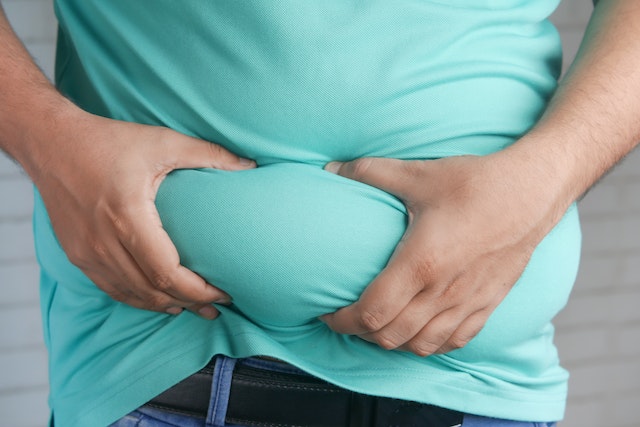
Why does the body produce fat? The body produces fat to store and release energy, for insulation, and to regulate body health.
Most of us have tried to lose weight, are trying to lose weight, or will try to lose weight at some point. What we mean by that is lose fat. However, we need fat to live. A body with not enough fat is not healthy, albeit in a different way to a body with too much fat. There is an optimal amount of fat for our height, build, gender, and that is what we should all be aiming for. My BMI is currently 24.2, which is just inside “healthy weight”, meaning I could do with losing a few kilograms of fat.
Fat is adipose tissue, which is a connective tissue that extends through the body. It can be found under the skin, between the internal organs, and inside bones. It is made up of adipocytes, which are fat cells. Each fat cell contains a lipid droplet, which are the stores of energy. There are two kinds of fat. There is white fat and brown fat. White fat is the kind that everybody carries and is the kind that we are trying to lose. Brown fat is generally only carried by babies and is used for making heat.
So, why does the body produce fat? A large reason is for the storage of energy. Just as you might put an extra can of petrol in your car when you go on a long journey, your adipose tissue is there for when you need energy. Many people think that if we eat a lot of fat or fatty food, we are going to put on more fat, but that isn’t true. When we eat food, it is broken down into its simplest forms. Those are glucose (the sugars), amino acids (the proteins), and fatty acids (the fats). Glucose and amino acids are absorbed directly into the blood stream, but fat molecules are too big to pass across the cell membranes, so they have to be broken down. They are broken down into glycerol and fatty acids before being absorbed into the cell wall of the intestine. The fat molecules are coated with proteins so that they can dissolve in water more easily. (Fats are hydrophobic, which means they repel water. That’s why a glass of fat and water won’t mix.) They are sent into the lymphatic system where they travel through that until it merges with a vein and they can go into the blood. They stay in the blood for about 8 minutes before they are broken down again into fatty acids.
So, that means the fat we eat becomes the fat in our body? No, it doesn’t. When we have eaten, the pancreas is stimulated to release insulin. Insulin’s job is to tell the cells of the liver, muscles, and adipose tissue to grab the glucose, fatty acids, and amino acids that are in the blood stream. It tells the cells to stop breaking down the glucose, fatty acids, and amino acids they already have stored and to start storing the incoming glucose, fatty acids, and amino acids. The fat cells mainly take the fatty acids because it takes less energy for them to do that than it does to turn glucose into fat cells. The glucose is taken by the other cells because it is a quick and easy source of energy. If we have eaten too many sugars (from refined carbohydrates usually), insulin production rises and there is a spike. The insulin suppresses the burning of fat and starts working hard to store the glucose in the fat cells and in the liver. If we eat foods that are lower in sugars, the insulin level doesn’t rise as high and the body returns to normal very quickly.
This is where fat comes in. When the blood sugar level is high, insulin is produced. When the blood sugar level is low, the body starts to convert fat cells into energy. The fat cells release fatty acids into the bloodstream where they enter cells that need them and they are converted into carbon dioxide, heat, and water. This conversion releases ATP, which is the energy that powers the cells.
So, what else does fat do? If you have the right amount of fat for your body, then it is responsible for releasing hormones such as leptin, estrogen, resistin, and cytokines. Leptin is a hormone that controls appetite. High levels tell your brain that you are full. Low levels tell the brain that you need to eat. Resistin and cytokines are involved in the immune system. However, if you have too much body fat, these hormones can work against you. In obese people, the sensitivity to leptin decreases, meaning it is harder for the brain to know when it is full or not. In obese people, resistin can cause inflation and has been linked to insulin resistance. These hormones and others, if a person has too much body fat, have been linked to metabolic syndrome and a host of diseases.
So, we need some fat in our bodies to live. Fat is where we store energy and it helps to regulate our appetite and is involved with our immune system. However, too much body fat can have serious health benefits. And this is what I learned today.
Sources
https://www.betterhealth.vic.gov.au/health/conditionsandtreatments/digestive-system
https://journals.biologists.com/jcs/article/122/6/749/30731/Lipid-droplets-at-a-glance
https://en.wikipedia.org/wiki/Adipocyte
https://www.cdc.gov/healthyweight/assessing/bmi/adult_bmi/metric_bmi_calculator/bmi_calculator.html
https://www.nih.gov/news-events/nih-research-matters/where-fat-comes
https://my.clevelandclinic.org/health/body/24052-adipose-tissue-body-fat
https://en.wikipedia.org/wiki/Adipose_tissue
https://www.ncbi.nlm.nih.gov/pmc/articles/PMC4587882/
https://researchmatters.in/news/scientists-study-how-insulin-helps-us-digest-fats
